Album
'Echoes of Our Island' is OUT NOW!
Available on Spotify, Apple Music, Amazon Music, YouTube and iHeart Radio
Preview
About the album
'Echoes of Our Island' is a selection of classical twentieth century songs on the theme of nature, written by some of the most influential English composers. The songs explore humans' connection with the natural world and the depiction of beautiful landscapes, whilst also addressing subjects such as the passage of time.
For their Final Year Major Project, Bianca and Maria have recorded their album titled 'Echoes of Our Island', with the help of recording engineer and producer Nicholas Paul. The album was released on Spotify, YouTube, and other streaming platforms in spring 2025. It features some of their favourite songs, and it includes a first public recording of Elizabeth Poston's 'The Lake Isle of Innisfree'.
For the album tracklist, click here:
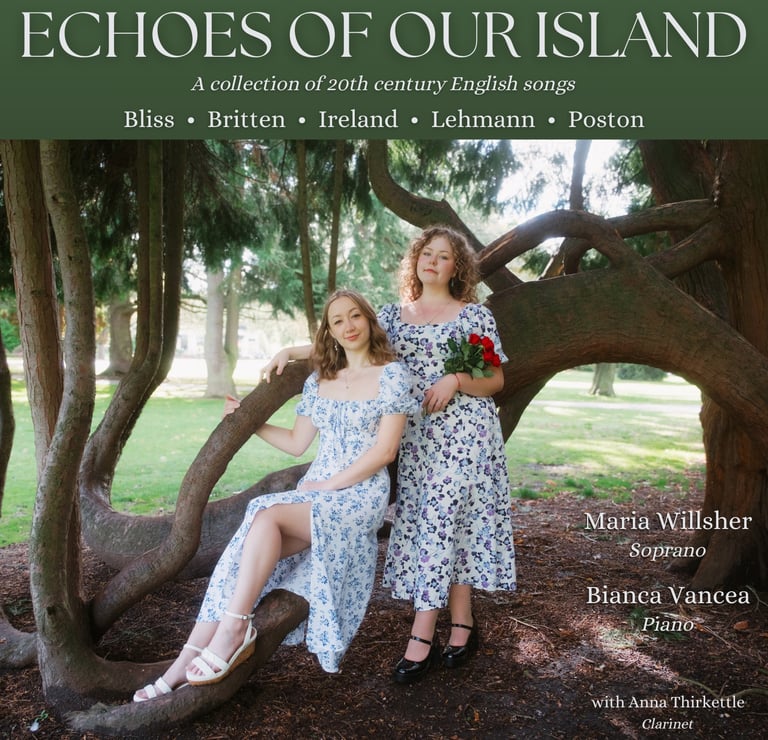

About the performers
Maria Willsher and Bianca Vancea have been collaborating since 2021 and they regularly perform as a duo in competitions, recitals and other professional engagements. They are both in their final year of undergraduate study at Royal Birmingham Conservatoire and are planning on continuing their collaboration after graduation.
In April 2022, they performed a selection of John Ireland songs and they both found they really enjoy working on them. They both enjoyed exploring the unique characteristics of twentieth century music, with its vibrant harmonies, rich textures and profound poetry, so Maria and Bianca went on to further explore the repertoire.
In May 2024, they performed in the final of the Edward Brooks English Song Prize and Maria was awarded Second Prize, whilst Bianca was awarded the Accompanist Prize.
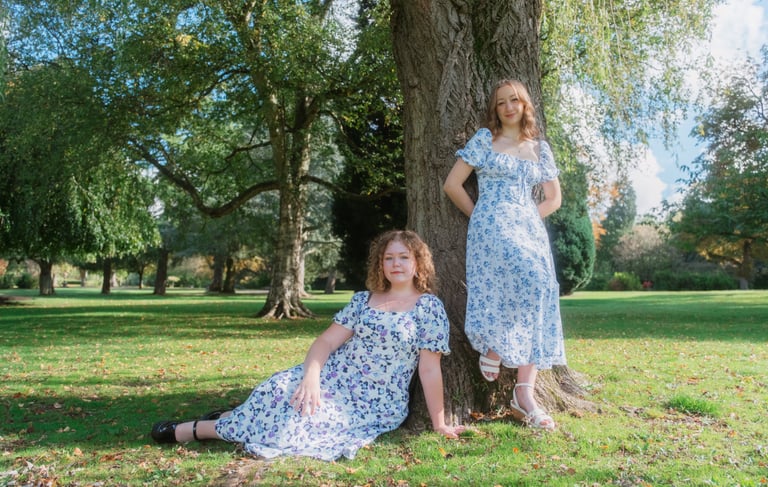

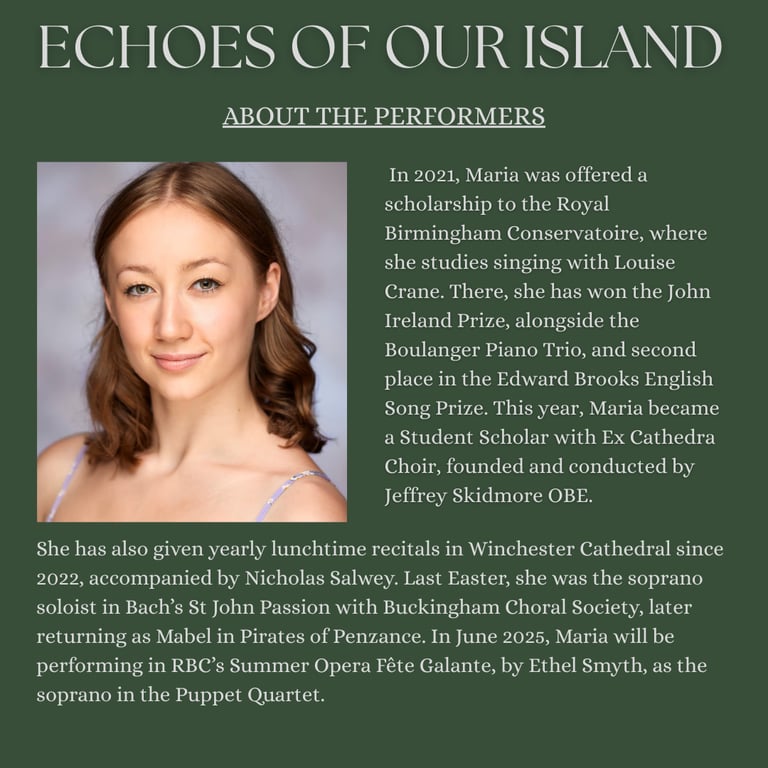

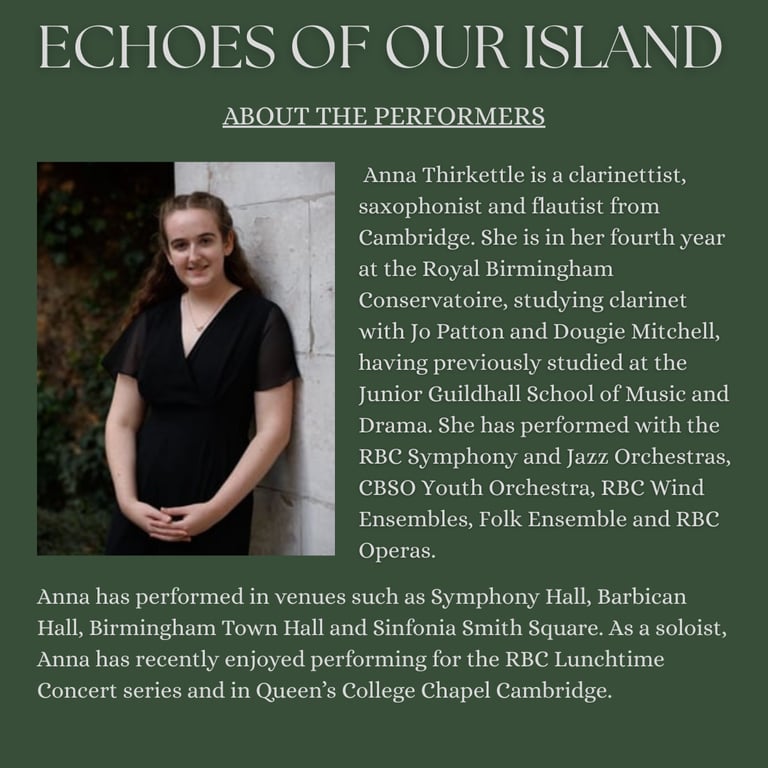

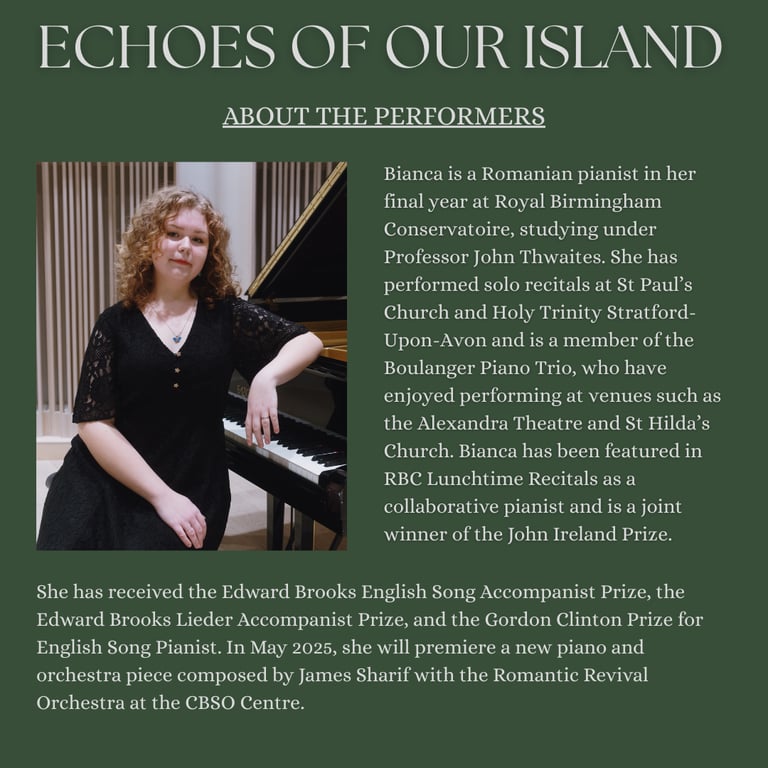

Tracks
Click on a track to see programme notes
The Land of Lost Content, No. 1: The Lent Lily - John Ireland
The Lake Isle of Innisfree - Elizabeth Poston
The Woodpigeon
The Starling
The Yellowhammer
The Wren
The Owl
Two Nursery Rhymes - Arthur Bliss
feat. Anna Thirkettle - clarinet
The Ragwort
The Dandelion
On This Island - Benjamin Britten
Let the Florid Music Praise
Now the Leaves are Falling Fast
Seascape
Nocturne
As it is, Plenty
Earth's Call (1918)
Composer: John Ireland (1879-1962); Poet: Harold Monro (1879-1932)
John Ireland is known for developing his own variety of English Impressionism, his music predominantly inspired by Debussy, Ravel, Stravinsky and Bartók. His compositional approach is characterised by a complex harmonic style and characterful accompaniment. Having studied piano and composition at the Royal College of Music, he later returned as a teacher himself in 1923; among his pupils there was Benjamin Britten, who claimed he found his teaching unremarkable. Ireland preferred chamber music, song, and piano music to larger orchestral ensembles, hence his works are often intensely personal in style. He was strongly inspired by his surroundings, harbouring a great love of rural English landscapes, which is reflected in his works. Despite being briefly married to a young woman in his 40s, Ireland was a closeted homosexual, indications of which are scattered throughout his vocal repertoire.
'Earth’s Call' (subtitled ‘A Sylvan Rhapsody’) was published in 1918. Harold Monro’s poem was published in a set called “Week-End”, the seventh verse of ten. The set as a whole describes a couple escaping the bustle of London for a tranquil weekend in the countryside. The urgency to relish fleeting moments is evident in 'Earth’s Call' in particular, as are the homosexual implications of the pair finding freedom in their seclusion, an understanding of which both Monro and Ireland shared. Ireland uses frantic oscillating sextuplets in the accompaniment to reflect the wilderness, transitioning into a middle section characterised by indulgent chords which profoundly display his appreciation for nature and the liberty it brings.
The Lent Lily (1921)
Composer: John Ireland (1879-1962); Poet: A. E. Housman (1859-1936)
John Ireland is known for developing his own variety of English Impressionism, his music predominantly inspired by Debussy, Ravel, Stravinsky and Bartók. His compositional approach is characterised by a complex harmonic style and characterful accompaniment. Having studied piano and composition at the Royal College of Music, he later returned as a teacher himself in 1923; among his pupils there was Benjamin Britten, who claimed he found his teaching unremarkable. Ireland preferred chamber music, song, and piano music to larger orchestral ensembles, hence his works are often intensely personal in style. He was strongly inspired by his surroundings, harbouring a great love of rural English landscapes, which is reflected in his works. Despite being briefly married to a young woman in his 40s, Ireland was a closeted homosexual, indications of which are scattered throughout his vocal repertoire.
‘The Lent Lily’ is the first song from the set ‘The Land of Lost Content’ published in 1921. A. E. Housman's poem, similarly to 'Earth's Call', reflects a desire to capture a moment before it dies away. It discusses the various flowers that spring yields, celebrating the daffodil (the lent lily) the most - as it has such a brief lifespan that one must strive to fully appreciate its beauty before it dies away.
The Lake Isle of Innisfree (1926)
Composer: Elizabeth Poston (1905-1987); Poet: W. B. Yeats (1865-1939)
Most widely recognised for her beloved Christmas carol 'Jesus Christ the Apple Tree', Elizabeth Poston’s musical career began at the Royal Academy of Music, where her compositional talent was supported by Peter Warlock and Ralph Vaughan Williams. Having moved her studies abroad throughout the 1930s, Poston returned to England as World War II approached and, soon after, was appointed Director of Music for the European Service at the BBC. It is rumoured that she worked as a secret agent during this time: using gramophone records to broadcast coded musical messages to resistance movements in Europe - although the exact nature of this work remains a secret.
'The Lake Isle of Innisfree' is an influential poem by William Butler Yeats, so symbolic of Celtic imagery and ideals that it features in Irish passports. The Isle is uninhabited, located in Lough Gill to the north-west of Ireland, near where Yeats spent his summers as a child. His poem expresses a profound yearning to be at one with nature, to escape urban life for the peace and tranquillity of Innisfree. Poston’s rendition was dedicated to her composition teacher Julius Harrison, and has not been commercially recorded until now.
Bird Songs (1907)
Composer: Liza Lehmann (1862-1918); Poet: A. S.
Born to a professional painter and a musician, Elizabetha ‘Liza’ Lehmann had much to inspire creativity in her childhood; including growing up in Germany, France and Italy and being encouraged by German composer Clara Schumann. She began her career as a singer, her excellent reputation later aiding her efforts in becoming one of England’s foremost female composers by the 20th century. Particularly adept at setting lighter material, many of her songs were for children, and her pianistic prowess enabled her to accompany herself in recitals. Towards the end of her life, Liza became the first president of the Society of Women Musicians in 1911 and a professor of singing at Guildhall in 1913.
The unnamed poet of these five 'Bird Songs' (A.S.) is thought to have been Alice Sayers, the Lehmann family nurse. Each song is set with its own unique personality, playfully capturing the essence of the bird it embodies, whilst romanticising their day to day activities and human interactions. The song cycle overall advocates for an intimate connection with nature, and characterfully portrays the array of birds we most commonly find in the UK.
Two Nursery Rhymes (1920)
Composer: Arthur Bliss (1891-1975); Poet: Frances Cornford (1886-1960)
After the sudden passing of his mother in 1895, an accomplished amateur pianist, Arthur Bliss’ widowed father took it upon himself to instill in his son a love for the arts. Inspired by Ravel, Vaughan Williams, and Howells, Bliss’ upper-middle-class education eventually led him to the Royal College of Music, where he studied for one year before being interrupted by the dawn of World War I. Bliss served with distinction in the army, but after being gassed, injured and losing his brother in the battle of the Somme, the emotional wounds he suffered there were deep and lasting. Nevertheless, his musical career continued to prosper, later working alongside Elizabeth Poston as Director of Music at the BBC during World War II. In 1953, the Queen recognised his virtuosity by appointing him Master of the Queen’s Music.
Published not long after his WWI trauma, 'Two Nursery Rhymes' was one of Bliss’ earlier compositions, set for voice, clarinet and piano. Frances Cornford, the poet, expresses her fascination with wildflowers here, likening them to regal, brave figures. A granddaughter of Charles Darwin and daughter of a botanist, her upbringing inspired a great appreciation for the natural world. Bliss highlights this in his music, evoking both fantasy and mischief whilst celebrating the small delights of ordinary life.
On This Island (1937)
Composer: Benjamin Britten (1913-1976); Poet: W. H. Auden (1907-1973)
Benjamin Britten was a leading British composer of the 20th century, particularly known for his operas, choral works and songs. At the age of 15, he began to study under Frank Bridge, who was an influential mentor throughout Britten’s early career. Unlike his contemporaries, Britten’s work displays psychologically dense and idiosyncratic approaches, comparable to those of Leoš Janáček. His contribution to the world of music, not only as a composer, but as a pianist and conductor, achieved global success.
Britten and W. H. Auden met in the summer of 1935 and worked closely together until 1942. Auden's romantic attachment to Britten was clear, encouraging him to accept his homosexuality and dedicating to him two poems from his collection 'Look Stranger!' (1936). ‘On This Island’ sets five poems from this series, and was published in 1937, Britten’s first collection of songs with piano. These texts each paint very different scenes and there is little unity musically between the songs - although the inevitable passing of time is an idea woven through each. Britten was forever influenced by Auden, although distanced himself later in the 40s, as he had for too long been troubled by Auden's oppressively dominant nature.
The first piece, ‘Let the Florid Music Praise!’ encompasses two different states of mind. One proclaims love, whilst the other is anxious and foreboding: the euphoria of the first stanza cannot last as 'time' will inevitably strip us all of our beauty. Britten separates the stanzas into two musical sections, juxtaposing the emotions by creating a distinct atmosphere for each. ‘Now the leaves are Falling Fast’ is set to the poem called ‘Autumn Song’. It explores the certainty of death and the uneasiness associated with the passing of time. The song presents a dark tone, describing a season which leads into a bleak, hopeless future, rather than one of abundance. In the third song, the undulating lines and dynamic rhythms capture the beauty of the 'Seascape', illustrating the sea and its cliffs. The perpetual motion of the waves demonstrates the unrefined energy of nature. As the song ends, the music dies down so gradually into nothingness that it seems the scene is moving far into the distance, whilst never truly ceasing. ‘Nocturne’ is the simplest of the set musically, yet it is rich in profundity, as Auden explores his interest in human nature. The search for meaning in the mundane and the perspective on humanity in nocturnal settings are supported by intense and atmospheric harmony. This ballad was dedicated to Peter Burra, Britten's dear friend, whose tragic death led to the fortuitous meeting of Britten and his eventual partner Peter Pears. The poem 'As it is, plenty’ is based on a story about man having an affair with an music hall acrobat. Britten's cabaret-esque setting playfully mocks the middle-class businessman through dark humour and a jaunty, minimalist, accompaniment.